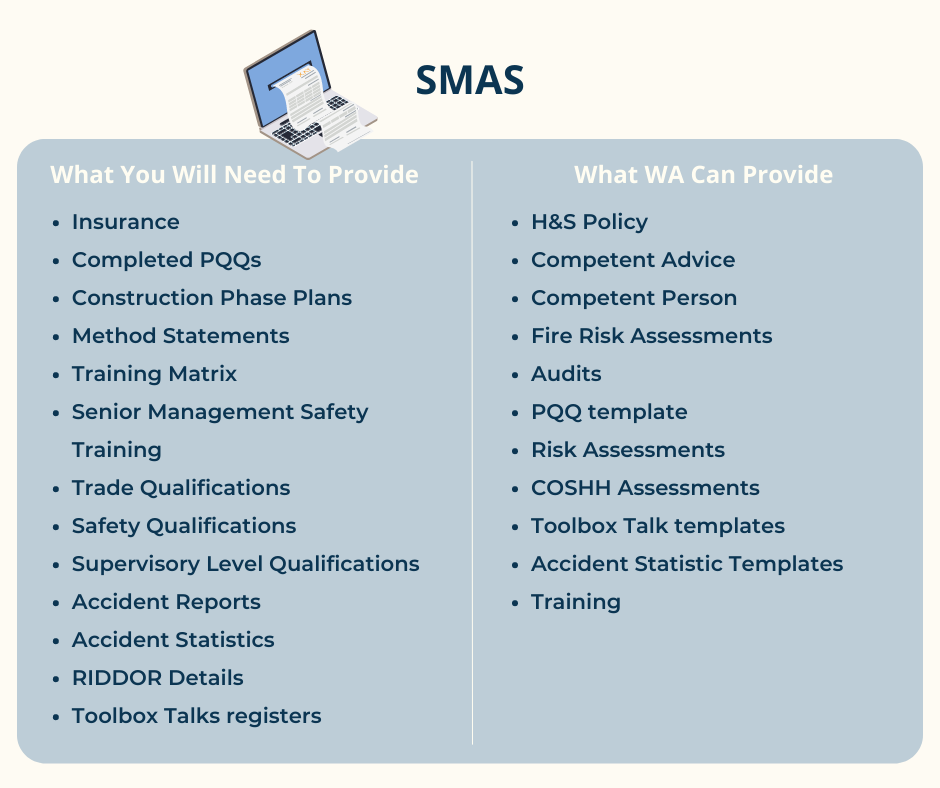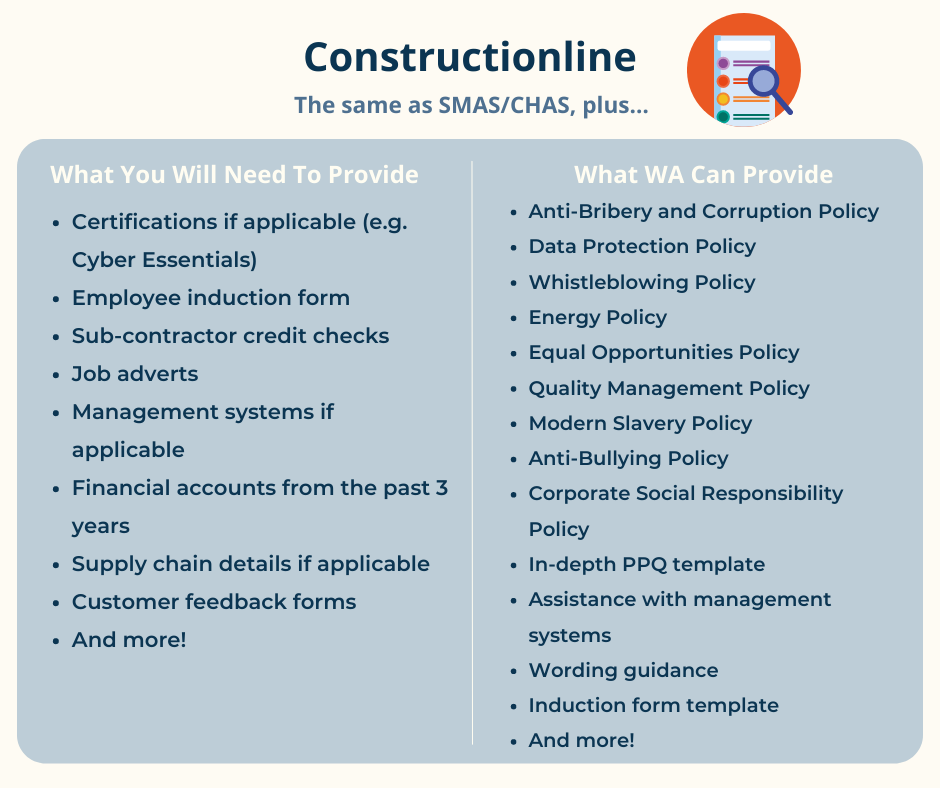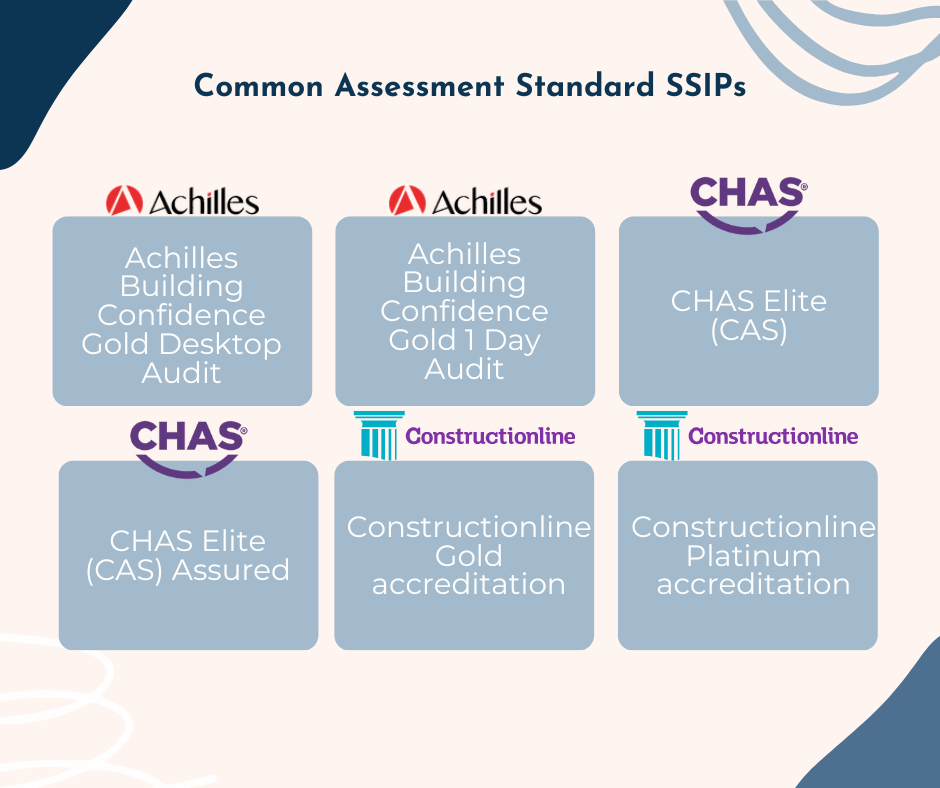We know that Safety Schemes in Procurement (SSIP) can feel overwhelming and confusing, from choosing the best one for you to completing the application process – particularly for small businesses. With that in mind, we’ve created a set of FAQs to help you understand SSIPs and navigate the application process.
1. What does SSIP stand for?
 SSIP stands for Safety Schemes in Procurement, and is an umbrella scheme which encompasses multiple health and safety assessment schemes, such as SMAS Worksafe and CHAS. The aim of SSIP is to maintain occupational health and safety standards.
SSIP stands for Safety Schemes in Procurement, and is an umbrella scheme which encompasses multiple health and safety assessment schemes, such as SMAS Worksafe and CHAS. The aim of SSIP is to maintain occupational health and safety standards.
Originally, the intention behind SSIPs was that companies would only need to get one, and then they would be considered equally by all principal contractors. Unfortunately, in practice this hasn’t worked out as different companies prefer different schemes – leading to contractors potentially having to hold multiple SSIPs to win contracts.
2. How do I get an SSIP certificate?
Certificates are not received directly from SSIP, but from one of their members (SMAS, CHAS, SafeContractor, etc.) – a full list of assessment schemes that are SSIP registered members can be found here.
3. Who should get an SSIP?
 Suppliers and contractors are the two groups who most commonly need an SSIP certification:-
Suppliers and contractors are the two groups who most commonly need an SSIP certification:-
- Suppliers – SSIP accreditation proves to businesses that they are safe to work with and follow health and safety procedures competently
- Contractors – Sites will often require contractors to be SSIP accredited to ensure the site is as safe as possible
4. Why should you get an SSIP?
An SSIP certification comes with a number of benefit. For example, you have a greater chance of winning contracts and finding more work if you are able to demonstrate compliance with health and safety regulations and legislation, and holding an SSIP certification means you may be able to save time by presenting this in place of having to fill out lengthy pre-qualification questionnaires You will also be discoverable through the SSIP portal, improving your market visibility.
Unfortunately, it does come with a cost – SSIPs are very expensive, so we would suggest only getting one if you have been specifically told that you need one, or is there is a particular contact that you want to try and win through being listed on the database.
5. What do you need for an SSIP application?
The requirements will vary depending on which SSIP certification you are aiming for – to help you understand what kind of documentation you need, we’ve broken down what’s required for the some of the most common SSIPs. We know it can be tricky to ensure you have all of the required paperwork, or to find the admin time to gather it all together, which is why we have also included what documents we can provide to help:
SMAS

CHAS

Constructionline

6. What does ‘Deem to Satisfy’ mean?
You might have noticed the term ‘Deem to Satisfy’ during an application, or while researching which SSIP you want to apply for. Essentially, ‘Deem to Satisfy’ works as a cross recognition – so if you have already received an SSIP certification from one SSIP member, you can use this to satisfy the health and safety criteria of another member scheme or trade association, without having to be audited again, saving time and resources.
The Deem to Satisfy Chart can be used to see H&S Assessment Scheme Product aligned to the Deem to Satisfy Agreement, outcome of the Deem to Satisfy, the cost saved, and any additional information the application will require.
Please be aware that there are still costs for attaining these SSIPs, even when using DTS, and some may still require you to answer additional questions!
7. What is the Common Assessment Standard?
 The Common Assessment Standard is a new form of accreditation by Build UK and CECA, which aims to improve efficiency and reduce cost in the construction pre-qualification process.
The Common Assessment Standard is a new form of accreditation by Build UK and CECA, which aims to improve efficiency and reduce cost in the construction pre-qualification process.
It is a higher level of standard with increased requirements, comprised of an industry-agreed question set that is regularly reviewed.
Many contractors and clients in the construction industry are beginning to specify that their supply chains are certified to this standard.
The SSIPs that meet this standard of certification are:
- Achilles BuildingConfidence Gold Desktop Audit
- Achilles BuildingConfidence Gold 1 Day Audit
- CHAS Elite (CAS)
- CHAS Elite (CAS) Assured
- Constructionline Gold accreditation
- Constructionline Platinum accreditation
In our experience, SSIPs at this level require a large amount of documentation, covering a range of topics – be prepared to gather and prepare a lot if you’re aiming for these certifications.
We know how difficult and time consuming these applications can be to complete, which is why we are here to help – get in touch for a quote and we can get started!
